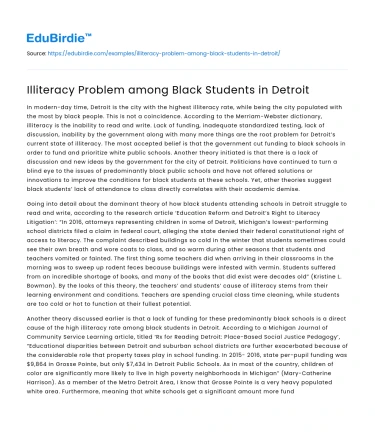In modern-day time, Detroit is the city with the highest illiteracy rate, while being the city populated with the most by black people. This is not a coincidence. According to the Merriam-Webster dictionary, illiteracy is the inability to read and write. Lack of funding, inadequate standardized testing, lack of discussion, inability by the government along with many more things are the root problem for Detroit’s current state of illiteracy. The most accepted belief is that the government cut funding to black schools in order to fund and prioritize white public schools. Another theory initiated is that there is a lack of discussion and new ideas by the government for the city of Detroit. Politicians have continued to turn a blind eye to the issues of predominantly black public schools and have not offered solutions or innovations to improve the conditions for black students at these schools. Yet, other theories suggest black students’ lack of attendance to class directly correlates with their academic demise.
Going into detail about the dominant theory of how black students attending schools in Detroit struggle to read and write, according to the research article ‘Education Reform and Detroit’s Right to Literacy Litigation’: “In 2016, attorneys representing children in some of Detroit, Michigan’s lowest-performing school districts filed a claim in federal court, alleging the state denied their federal constitutional right of access to literacy. The complaint described buildings so cold in the winter that students sometimes could see their own breath and wore coats to class, and so warm during other seasons that students and teachers vomited or fainted. The first thing some teachers did when arriving in their classrooms in the morning was to sweep up rodent feces because buildings were infested with vermin. Students suffered from an incredible shortage of books, and many of the books that did exist were decades old” (Kristine L. Bowman). By the looks of this theory, the teachers’ and students’ cause of illiteracy stems from their learning environment and conditions. Teachers are spending crucial class time cleaning, while students are too cold or hot to function at their fullest potential.
Save your time!
We can take care of your essay
- Proper editing and formatting
- Free revision, title page, and bibliography
- Flexible prices and money-back guarantee
Another theory discussed earlier is that a lack of funding for these predominantly black schools is a direct cause of the high illiteracy rate among black students in Detroit. According to a Michigan Journal of Community Service Learning article, titled ‘Rx for Reading Detroit: Place-Based Social Justice Pedagogy’, “Educational disparities between Detroit and suburban school districts are further exacerbated because of the considerable role that property taxes play in school funding. In 2015- 2016, state per-pupil funding was $9,864 in Grosse Pointe, but only $7,434 in Detroit Public Schools. As in most of the country, children of color are significantly more likely to live in high poverty neighborhoods in Michigan” (Mary-Catherine Harrison). As a member of the Metro Detroit Area, I know that Grosse Pointe is a very heavy populated white area. Furthermore, meaning that white schools get a significant amount more funding than black schools. Each pupil in the white-dominated area of Grosse Point gets $2,430 more dollars to their name. This is money that can be equally distributed to black students to help pay for new technologies, programs, textbooks, and teachers.
Looking at all of these reasons, it is not difficult to assume that it was perhaps a combination of these factors that was the effect of the high illiteracy rate for black students in Detroit. Besides the absence of change from politicians in Detroit, the lack of funding for predominantly black schools, and inadequate standardized testing, there may be various other extensive reasons to consider. We may never know for sure, but we do know that the illiteracy rate for black students in Detroit needs to increase for the betterment of society.






 Stuck on your essay?
Stuck on your essay?

